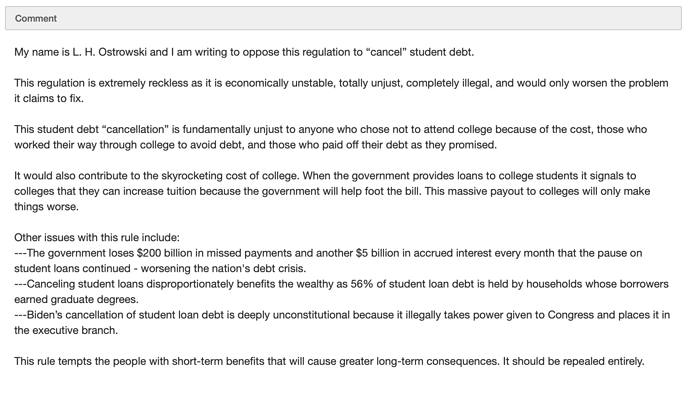Hi everyone,
The proposed Income Driven Repayment (IDR) regulations are long and a bit complicated. We know that IDR is a non-solution and that the only real solution is full cancellation and fully funded College For All. However, in the meantime IDR can give millions of people a safe way to join the student debt strike and stay at $0 monthly payments while we continue fight for the real solutions. And in that respect there are a lot of good things about these proposals, with a lot of room for improvement. So I think some comments along the lines of “this is a good start, go further” would be helpful.
Here are some highlights about what is good in these proposals.
-
For people with undergrad debt it lowers the monthly payment, and many more people will get to $0 a month.
-
For some people it will dramatically shorten the timeline to cancellation, for some people it could be as short as 12 years (still way too long but this is compared to 20 or 25 under the old plans.
-
It ends “negative amortization” which is just a fancy way of saying it will put an end to interest causing people’s balances to balloon out of control if the monthly payments don’t cover the interest. This is huge for many people.
What is bad, and places you might want to push them in a public comment:
-
They exclude everyone with a Parent PLUS loan! This is BS. If you have a Parent PLUS loan please comment and demand they make a path to inclusion, even if that means consolidating your loan into a new direct loan to be included. Even if you don’t currently have a Parent PLUS loan you might have one in the future, or maybe your parents have one. In my view this is the #1 thing we should push them on and hard.
-
This gets a bit technical, but they have some BS calculations that only protect your income upto 225% of the federal poverty guidelines. They are literally doing this to keep student debtors at the equivalent of minimum wage workers and so that people have the same level of food insecurity as people at the federal poverty line who don’t have student debt. I know that sounds unbelievable but just read the regulations, they say it all out loud. They are carefully calibrating your student loan payment to make sure that some of you can’t afford to eat! This is BS. Demand that they raise the amount of income that is protected so that people can eat (they considered and rejected 400% so maybe you want to say raise it to 400%, but even that is too little).
-
They treat graduate debt differently than undergrad debt. Grad debt is still included, but you will have to pay twice as much as undergrad debt.
If you want to make a comment you can do so here:
https://www.regulations.gov/comment/ED-2023-OPE-0004-0687

